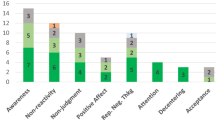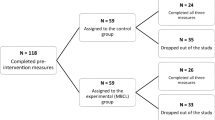Abstract
There are ongoing questions regarding the similarities and differences in the clinical impact and processes of change for cognitive restructuring and cognitive defusion. This clinical component test compared 87 adults high in self-criticism randomized to a cognitive defusion mobile app, restructuring app, or waitlist condition for 2 weeks. Equivalent improvements were found from the defusion and restructuring apps relative to the waitlist on self-criticism and distress as well as decentering, self-compassion, and dysfunctional attitudes. However, the defusion condition had a more consistent pattern of improvements relative to waitlist. Improvements in cognitive decentering, self-compassion, and dysfunctional attitudes mediated effects for cognitive defusion relative to waitlist. These mediators were inconsistent for cognitive restructuring. Improvements in self-compassion and cognitive decentering correlated with improvements in outcomes in the defusion condition, but not the restructuring condition. Overall, these results suggest mobile apps providing cognitive defusion and cognitive restructuring strategies are equally effective, but work through distinct processes of change.

Similar content being viewed by others
References
Baiao, R., Gilbert, P., McEwan, K., & Carvalho, S. (2015). Forms of self-criticising/attacking & self-reassuring scale: Psychometric properties and normative study. Psychology and Psychotherapy: Theory, Research and Practice, 88, 438–452.
Bangor, A., Kortum, P. T., & Miller, J. T. (2008). An empirical evaluation of the system usability scale. International Journal of Human-Computer Interaction, 24, 574–594.
Barrera, T. L., Szafranski, D. D., Ratcliff, C. G., Garnaat, S. L., & Norton, P. J. (2016). An experimental comparison of techniques: Cognitive defusion, cognitive restructuring, and in-vivo exposure for social anxiety. Behavioral and Cognitive Psychotherapy, 44, 249–254.
Beck, A. T., & Haigh, E. A. P. (2014). Advances in cognitive theory and therapy: The generic cognitive model. Annual Review of Clinical Psychology, 10, 1–24.
Brooke, J. (1996). SUS: A “quick and dirty” usability scale. In P. W. Jordan, B. Thomas, B. A. Weerdmeester & I. L. McClelland (Eds.), Usability evaluation in industry (pp. 189–194). London: Taylor and Francis.
Cox, B. J., Walker, J. R., Enns, M. W., & Karpinski, D. C. (2002). Self-criticism in generalized social phobia and response to cognitive-behavioral treatment. Behavior Therapy, 33, 479–491.
de Graaf, I. E., Roelofs, J., & Hubers, M. J. H. (2009). Measuring dysfunctional attitudes in the general population: The dysfunctional attitude scale (form a) revised. Cognitive Therapy and Research, 33, 345–355.
Deacon, B. J., Fawzy, T. I., Lickel, J. J., & Wolitzky-Taylor, K. B. (2011). Cognitive defusion versus cognitive restructuring in the treatment of negative self-referential thoughts: An investigation of process and outcome. Journal of Cognitive Psychotherapy: An International Quarterly, 25, 218–232.
Fresco, D. M., Moore, M. T., van Dulmen, M., Segal, Z. V., Teasdale, J. D., Ma, H., & Williams, J. M. G. (2007). Initial psychometric properties of the experiences questionnaire: Validation of a self-report measure of decentering. Behavior Therapy, 38, 234–246.
Gilbert, P., Clark, M., Hempel, S., Miles, J. N. V., & Irons, C. (2004). Criticising and reassuring oneself: An exploration of forms, styles and reasons in female students. British Journal of Clinical Psychology, 43, 31–50.
Gilbert, P., & Procter, S. (2006). Compassionate mind training for people with high shame and self-criticism: Overview and pilot study of a group therapy approach. Clinical Psychology and Psychotherapy, 13, 353–379.
Gillanders, D. T., Bolderston, H., Bond, F. W., Dempster, M., Flaxman, P. E., Campbell, L., et al. (2014). The development and initial validation of the cognitive fusion questionnaire. Behavior Therapy, 45, 83–101.
Gross, J. J., & John, O. P. (2003). Individual differences in two emotion regulation processes: Implications for affect, relationships, and well-being. Journal of Personality and Social Psychology, 85, 348–362.
Hayes, S. C., & Hofmann, S. G. (2018). Process-based CBT: The science and core clinical competencies of cognitive behavioral therapy. Oakland: New Harbinger.
Hayes, S. C., Strosahl, K. D., & Wilson, K. G. (2012). Acceptance and commitment therapy: The process and practice of mindful change. New York: The Guilford Press.
Hayes, S. C., Villatte, M., Levin, M. E., & Hildebrandt, M. (2011). Open, aware, and active: Contextual approaches as an emerging trend in the behavioral and cognitive therapies. Annual Review of Clinical Psychology, 7, 141–168.
Kazdin, A. E. (1978). Evaluating the generality of findings in analogue therapy research. Journal of Consulting and Clinical Psychology, 46, 673–686.
Larsson, A., Hooper, N., Osborne, L. A., Bennett, P., & McHugh, L. (2016). Using brief cognitive restructuring and cognitive defusion techniques to cope with negative thoughts. Behavior Modification, 40, 452–482.
Levin, M. E., Hildebrandt, M., Lillis, J., & Hayes, S. C. (2012). The impact of treatment components suggested by the psychological flexibility model: A meta-analysis of laboratory-based component studies. Behavior Therapy, 43, 741–756.
Longmore, R. J., & Worrell, M. (2007). Do we need to challenge thoughts in cognitive behavior therapy? Clinical Psychology Review, 27, 173–187.
Lovibond, P. F., & Lovibond, S. H. (1995). The structure of negative emotional states: Comparison of the depression anxiety stress scales (DASS) with the beck depression and anxiety inventories. Behaviour Research and Therapy, 33, 335–343.
Luoma, J. B., & Platt, M. G. (2015). Shame, self-criticism, self-stigma, and compassion in acceptance and commitment therapy. Current Opinion in Psychology, 2, 97–101.
Moffitt, R., Brinkworth, G., Noakes, M., & Mohr, P. (2012). A comparison of cognitive restructuring and cognitive defusion s strategies for resisting a craved food. Psychology & Health, 27, 74–90.
Mundt, J. C., Marks, I. M., Shear, M. K., & Greist, J. H. (2002). The work and social adjustment scale: A simple measure of impairment in functioning. British Journal of Psychiatry, 180, 461–464.
Preacher, K. J., & Hayes, A. F. (2004). SPSS and SAS procedures for estimating indirect effects in simple mediation models. Behavior Research Methods, Instruments, and Computers, 36, 717–731.
Raes, F., Pommier, E., Neff, K. D., & Van Gucht, D. (2011). Construction and factorial validation of a short form of the Self-Compassion Scale. Clinical Psychology & Psychotherapy, 18, 250–255.
Rector, N. A., Bagby, R. M., Segal, Z. V., Joffe, R. T., & Levitt, A. (2000). Self-criticism and dependency in depressed patients treated with cognitive therapy or pharmacotherapy. Cognitive Therapy and Research, 24, 571–584.
Segal, Z. V., Teasdale, J. D., & Williams, J. M. G. (2004). Mindfulness-based cognitive therapy: Theoretical rationale and empirical status. In S. C. Hayes, V. M. Follette, & M. Linehan (Eds.), Mindfulness and acceptance: Expanding the cognitive-behavioral tradition (pp. 45–65). New York: Guilford Press.
Torous, J. B., Levin, M. E., Ahern, D., & Oser, M. (2017). Cognitive behavioral mobile applications: Research literature, marketplace data, and evaluation guidelines. Cognitive and Behavioral Practice, 24, 215–225.
Verbeke, G., & Molenberghs, G. (2000). Linear mixed models for longitudinal data. New York: Springer.
Wackerly, D. D., Mendenhall, W., & Scheaffer, R. L. (2008). Mathematical statistics with applications. Belmont: Thomson Brooks/Cole.
Wells, A. (2008). Metacognitive therapy: Cognition applied to regulating cognition. Behavioral and Cognitive Psychotherapy, 36, 651–658.
Yovel, I., Mor, N., & Shakarov, H. (2014). Examination of the core cognitive components of cognitive behavioral therapy and acceptance and commitment therapy: An analogue investigation. Behavior Therapy, 45, 482–494.
Zelkowitz, R. L., & Cole, D. A. .(2018). Self-criticism as a transdiagnostic process in nonsuicidal self-injury and disorered eating: Systematic review and meta-analysis. Suicide and Life-Threatening Behavior (in press).
Zettle, R. D. (2005). The evolution of a contextual approach to therapy: From comprehensive distancing to ACT. International Journal of Behavioral Consultation and Therapy, 1, 77–89.
Author information
Authors and Affiliations
Corresponding author
Ethics declarations
Conflict of Interest
Dr. Levin is a research associate with Contextual Change LLC, a business focused on developing online acceptance and mindfulness programs for student mental health. Dr. Twohig, Mr. Haeger, and Ms. An declare they have no conflict of interest.
Ethical Approval
All procedures performed in studies involving human participants were in accordance with the ethical standards of the institutional research committee and with the 1964 Helsinki declaration and its later amendments or comparable ethical standards.
Animal Rights
This article does not contain any studies with animals performed by any of the authors.
Informed Consent
Informed consent was obtained from all individual participants included in the study.
Rights and permissions
About this article
Cite this article
Levin, M.E., Haeger, J., An, W. et al. Comparing Cognitive Defusion and Cognitive Restructuring Delivered Through a Mobile App for Individuals High in Self-Criticism. Cogn Ther Res 42, 844–855 (2018). https://doi.org/10.1007/s10608-018-9944-3
Published:
Issue Date:
DOI: https://doi.org/10.1007/s10608-018-9944-3




